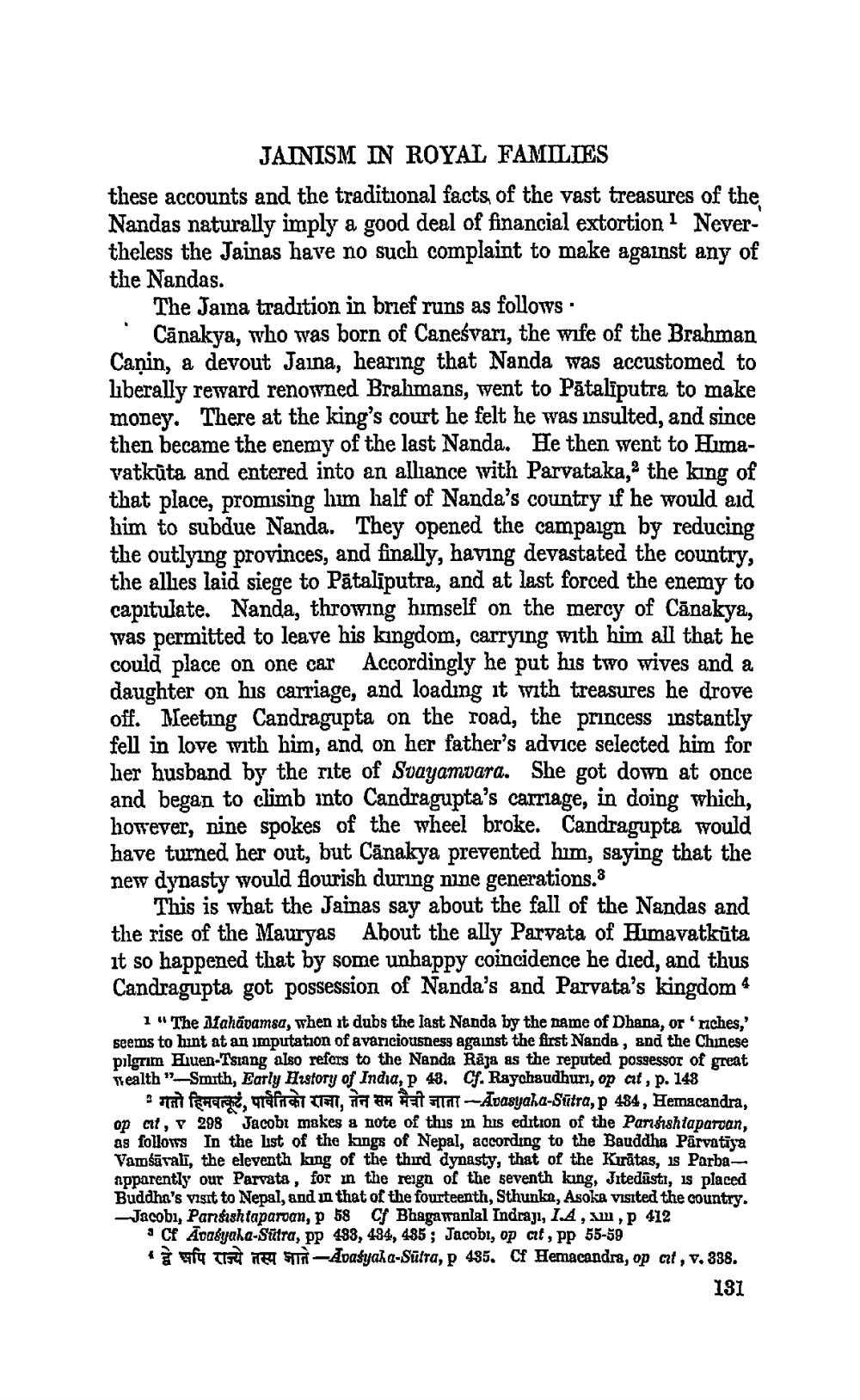________________ JAINISM IN ROYAL FAMILIES these accounts and the traditional facts of the vast treasures of the Nandas naturally imply a good deal of financial extortion! Nevertheless the Jainas have no such complaint to make against any of the Nandas. The Jaina tradition in brief runs as follows: Canakya, who was born of Canesvari, the wife of the Brahman Canin, a devout Jaina, hearing that Nanda was accustomed to liberally reward renowned Brahmans, went to Pataliputra to make money. There at the king's court he felt he was insulted, and since then became the enemy of the last Nanda. He then went to Himavatkuta and entered into an alliance with Parvataka, the king of that place, promising him half of Nanda's country if he would aid the outlying provinces, and finally, having devastated the country, the allies laid siege to Pataloputra, and at last forced the enemy to capitulate. Nanda, throwing himself on the mercy of Canakya, was permitted to leave his kingdom, carrying with him all that he could place on one car Accordingly he put his two wives and a daughter on his carriage, and loading it with treasures he drove off. Meeting Candragupta on the road, the princess instantly fell in love with him, and on her father's advice selected him for lier husband by the rite of Svayamvara. She got down at once and began to climb into Candragupta's carriage, in doing which, however, nine spokes of the wheel broke. Candragupta would have turned her out, but Canakya prevented him, saying that the new dynasty would flourish during nine generations. This is what the Jainas say about the fall of the Nandas and the rise of the Mauryas About the ally Parvata of Himavatkuta it so happened that by some unhappy coincidence he died, and thus Candragupta got possession of Nanda's and Parvata's kingdom 4 1 The Mahavamsa, when it dubs the last Nanda by the name of Dhana, orches, seems to hunt at an imputation of avariciousness against the first Nanda, and the Chinese pilgrim Hiuen-Tsiang also refers to the Nanda Raja as the reputed possessor of great Tealth Smith, Early History of India, P 48. Cy. Raychaudhuri, op cit, p. 148 T EHEER, SAT FI, FATEH HELT ATAvasyaha-Stitra, p 484, Hemacandra, op cit, 298 "Jacobi makes a note of this in his edition of the Parsishtapatuan, as follows In the list of the kings of Nepal, according to the Bauddha Parvatiya Vamsarall, the eleventh king of the third dynasty, that of the Kiratas, is Parba npparently our Parvata, for in the reign of the seventh king, Jitedasti, is placed Buddha's visit to Nepal, and in that of the fourteenth, Sthunka, Asoka visited the country. -Jacobi, Parsishtaparvan, p 58 Cf Bhagawanlal Indraji, 1.4, m ,p 412 C Apabyala-Satra, pp 498, 494, 485; Jacobi, op cit, pp 55-59 wf TIREU SIT Avastyaha-Sura, p 435. Cf Hemacandra, op cit, v. 388. 131




